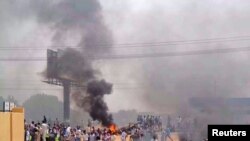WASHINGTON, D.C. —
Sudan spends as much fighting in ongoing conflicts in Darfur, South Kordofan and Blue Nile as it did on the fuel subsidies that it cut last month, sparking weeks of deadly protests in Khartoum, the US special envoy to South Sudan and Sudan told VOA News, citing U.S. government estimates.
"What they spend on fuel subsidies is about what they spend, as we understand it, on war, so if they could make peace, they also would have been able to save money," Donald Booth told South Sudan in Focus co-host John Tanza in an interview.
Rights groups say around 200 people have been killed by security forces since the protests began in late September, when the government ended subsidies on several items, in an attempt to bring a runaway budget deficit under control.
Booth said the government's decision to lift subsidies, particularly on fuel, "seems to have been the approximate spark for the demonstrations in Khartoum."
Sudanese President Omar al-Bashir has said the protests are an attempt to oust him from power. The authorities in Sudan have put the protests' death toll at between 60 and 70.
The U.S. Department of State on Friday issued a new warning against travel to Sudan, especially to Darfur, Blue Nile and Southern Kordofan states.
Four United Nations peacekeepers have been killed in Darfur since Friday, three of them from Senegal and one from Zambia.
The U.N. has about 20,000 peacekeepers in Darfur, where rebel groups, largely drawn from black African farming villages, have been fighting militia groups backed by the Arab-dominated government in Khartoum, since 2003.
Some 300,000 people have been killed and more than two million others have been driven from their homes in the fighting in Darfur.
Rebels in Blue Nile and South Kordofan, meanwhile, fought against Khartoum during Sudan's decades-long civil war but were left on the Sudanese side of the border after South Sudan became an independent country in July 2011.
The conflict in South Kordofan broke out anew in June 2011, a month before South Sudan seceded, and rebels in Blue Nile resumed their fight against Khartoum in September 2011, a few months after the south split from the north.
Hundreds of thousands of people have fled their homes since 2011 because of the fighting in the two border states.
"What they spend on fuel subsidies is about what they spend, as we understand it, on war, so if they could make peace, they also would have been able to save money," Donald Booth told South Sudan in Focus co-host John Tanza in an interview.
Rights groups say around 200 people have been killed by security forces since the protests began in late September, when the government ended subsidies on several items, in an attempt to bring a runaway budget deficit under control.
Booth said the government's decision to lift subsidies, particularly on fuel, "seems to have been the approximate spark for the demonstrations in Khartoum."
Sudanese President Omar al-Bashir has said the protests are an attempt to oust him from power. The authorities in Sudan have put the protests' death toll at between 60 and 70.
U.S. Issues Travel Warning for Sudan
The U.S. Department of State on Friday issued a new warning against travel to Sudan, especially to Darfur, Blue Nile and Southern Kordofan states.
Four United Nations peacekeepers have been killed in Darfur since Friday, three of them from Senegal and one from Zambia.
The U.N. has about 20,000 peacekeepers in Darfur, where rebel groups, largely drawn from black African farming villages, have been fighting militia groups backed by the Arab-dominated government in Khartoum, since 2003.
Some 300,000 people have been killed and more than two million others have been driven from their homes in the fighting in Darfur.
Rebels in Blue Nile and South Kordofan, meanwhile, fought against Khartoum during Sudan's decades-long civil war but were left on the Sudanese side of the border after South Sudan became an independent country in July 2011.
The conflict in South Kordofan broke out anew in June 2011, a month before South Sudan seceded, and rebels in Blue Nile resumed their fight against Khartoum in September 2011, a few months after the south split from the north.
Hundreds of thousands of people have fled their homes since 2011 because of the fighting in the two border states.




